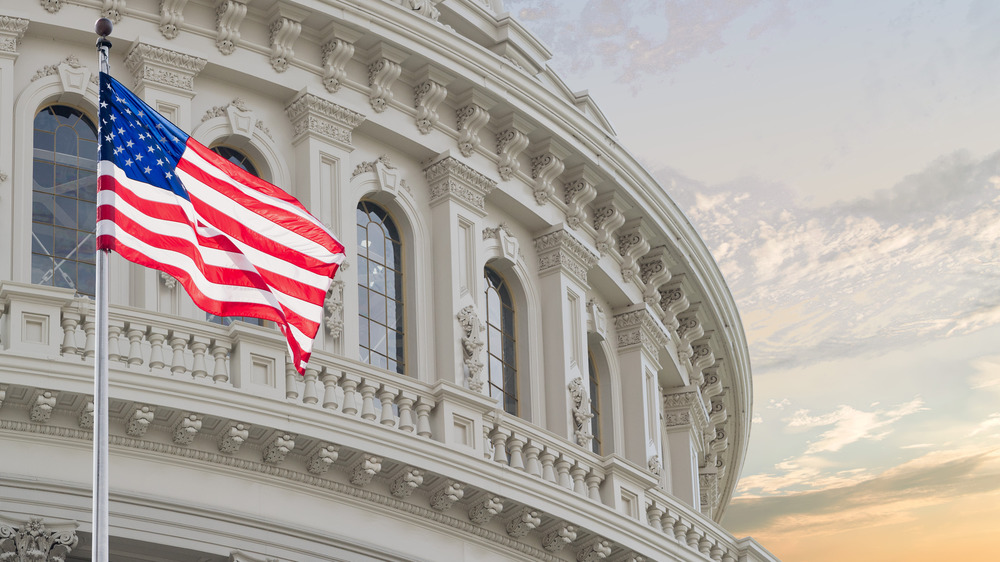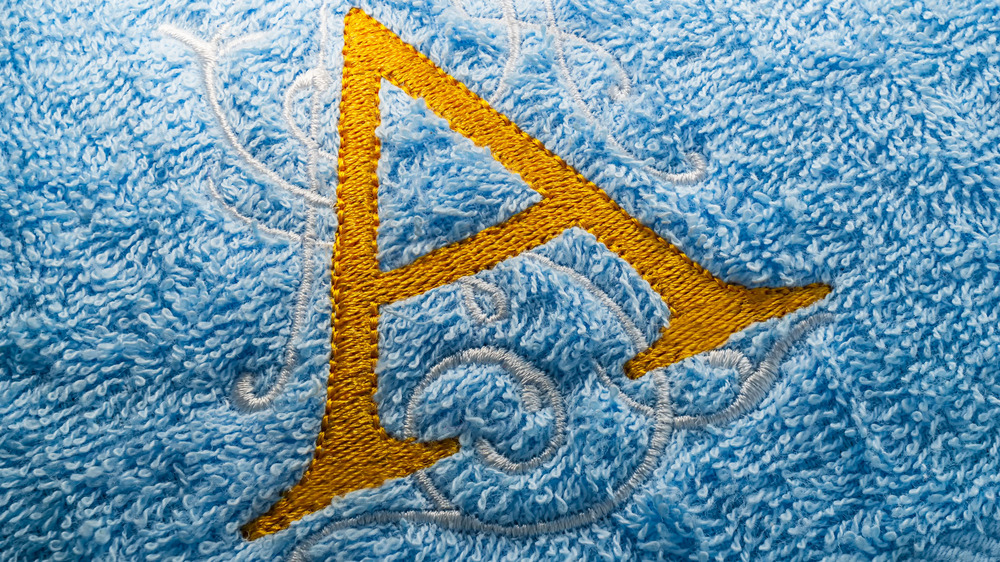Signs That Can Help You Tell If Someone Is A Narcissist
The term "narcissist" comes from a Greek myth about a guy named Narcissus who was so self-absorbed that he literally fell in love with his own reflection in a pool of water (and then starved to death because he couldn't look away, so... cautionary tale). In modern times, we use the word "narcissist" to describe people who have "an extreme feeling of self-importance, a sense of entitlement, and a need to be admired," according to Psychology Today. And per the Mayo Clinic, narcissistic personality disorder is a mental condition that can make relationships particularly difficult.
Narcissism that's not taken to extreme can have some positive effects; narcissists tend to score high for creativity and self-esteem, and have lower levels of anxiety and depression, a research study in PLOS One demonstrated. But they also have trouble handling negative feedback, have low scores for empathy, and can become angry and aggressive if they don't get the adulation they feel they deserve. If you suspect someone in your life is a narcissist — and there's not a pool of water nearby to test this theory — here are some ways to identify the narcissists among us.
If someone says I'm a narcissist, believe them
There may be no quicker, easier way to identify a narcissist than to go right to the source. A team of psychology researchers found this out when they tried to create a method to identify narcissism for research studies, an article in PLOS One showed. While standard personality tests for narcissism consisted of questionnaires with 40 to 50 questions, these researchers wanted an alternate, simpler method that could be used by scientists under time constraints. So they boiled it all down to this one question and accompanying explanation: "To what extent do you agree with this statement: I am a narcissist. (Note: The word 'narcissist' means egotistical, self-focused, and vain.)"
The question is answered on a scale from 1 (not very true) to 11 (very true). In a series of 11 studies, the researchers put the question to various groups of volunteers, also having them complete other personality measures. Sure enough, a high score on this question was predictive of scoring high for narcissism on longer questionnaires.
Narcissists don't admit their mistakes
A series of studies examining how narcissists make decisions confirmed an interesting thing about them (via ScienceDaily). Narcissists, it seems, often engage in "hindsight bias" — meaning that after an event, they exaggerate how much foresight they had (e.g., "I knew it all along"). But when their actual predictions about an event turns out to be wrong, they'll switch gears and claim the opposite (e.g., "No one could have seen this coming!").
This is troubling because it means narcissists don't engage in what's known as "counterfactual thinking," that is, thinking critically about decisions they've made and what they should or could have done differently. If things go well — even if it's by sheer luck — they take credit and feel like winners, confirming their self-image. If things go badly, it would threaten their self-image to be critical of their own decisions. So, instead, they tell themselves that there was nothing they could do about it. In both cases, the narcissist's inability to ask "why did this happen?" is a missed opportunity to learn from a failure or success.
You can tell a narcissist by their social media profile
Does narcissism fuel social media use? Or does using social media encourage narcissism? This has been a subject of discussion among social scientists since the earliest days of likes and shares. The picture that's emerged suggests that the effect goes both ways. That said, social media certainly rewards narcissistic tendencies, according to a research summary published in 2020, allowing us to announce our achievements, gain recognition, and achieve status through a large number of superficial relationships.
As highlighted in the summary, studies show that narcissists share more photos and updates, have more online friends and followers, and generally spend more time using social media than non-narcissists. Narcissists are also more likely to delete posts that don't get as many likes as they wanted, and they keep a closer eye on other peoples' likes and comments. Plus, narcissists post more self-promoting content and selfies.
It's not hard to recognize this behavior for what it is. Even when social media was relatively new, a 2008 study published in Personality and Social Psychology Bulletin found that people were pretty good at identifying narcissists by simply scrolling through their Facebook pages.
Narcissists aren't into the whole democracy thing
Winston Churchill once noted that "democracy is the worst form of Government except for all those other forms that have been tried from time to time." A narcissist would beg to differ, asserting that democracy is simply the worst. Full stop.
In a 2018 study published in the British Journal of Social Psychology, researchers surveyed several hundred adults in the U.S. and Poland, asking them questions about their support for democracy and testing them for narcissism traits. The more that respondents agreed with negative statements about democracy — like "Democracies are indecisive and squabble too much" or "Democracies aren't good at maintaining order" — the more likely they were to score high for narcissism.
It could be that narcissists have less support for democracy because they tend to feel superior to others and have a "lower tolerance for diverse opinions," the researchers suggested. Another factor may be that narcissists have more tolerance for narcissistic traits in others, so they're less bothered by authoritarian political policies.
Narcissists excel in job interviews
"But enough about me. Let's talk about what you think of me." For most of us, a job interview is, at least to some degree, an uncomfortable situation. After all, it's not easy to have a prolonged conversation about how skilled and competent you are, projecting confidence and masking your deficits. But that's what's required in a job interview. It's called self-promotion, and it's also exactly what narcissists are good at.
In fact, research published in the Journal of Applied Social Psychology found that narcissists become more "forceful" when promoting themselves if they're told that they're being interviewed by an expert in their field, while most of us would dial back on our claims for fear of being caught in an exaggeration. Furthermore, when mock job interviews were conducted, narcissists received higher scores specifically because they praised themselves more than non-narcissists did.
The lesson to be learned, said the researchers, is that a job interview is one scenario in which the normal rules about bragging do not apply. Modesty is the wrong move, while the narcissistic strategy of repeatedly calling attention to your own best qualities is a winning technique.
Narcissists are often considered to be good bosses ... until you look closer
Narcissists have a knack for rising to the top of an organization, thanks to their confidence and tendency to be dominant. However, research suggests that this projection of competence is an illusion that masks the narcissist's shortcomings. One study published in the Journal of Applied Psychology examined data on managers from 175 retail stores and found that those who had high scores for narcissism tended to have less experience when they were hired, implying that their personality disguised their résumé.
That research also found that managers with high scores for narcissism got high scores for leadership — but only from people who had few chances to observe them. In another study, volunteers were put in groups of three to complete a task, with one person randomly assigned to lead. If the leader had a high score for narcissism, they tended to be rated as a good leader by their teammates. But their team's actual performance tended to be bad, because the narcissistic leader didn't encourage the communication and collaboration that was needed to successfully complete their task (via Association for Psychological Science).
Narcissists go for the customized stuff
We live in an age where we can buy a custom version of almost everything — from T-shirts to tote bags to even a custom-colored car. But retailers are often disappointed to find that only a small portion of consumers take advantage of more profitable customization options. Narcissism may be the factor that motivates people to "self design" the products they buy, according to series of consumer behavior experiments (via ScienceDirect).
When researchers interviewed recent car buyers about their choices and gave them personality tests, they found that consumers with high narcissism scores were more likely to go for customized options. Follow-up studies showed that inducing "a temporary narcissistic state of mind" — by asking people to remember a time when they'd impressed someone — made consumers more prone to choose a custom car.
Exposure to an ad that played up narcissism ("You impress. Like the new Audi D6") had a similar effect. According to the researchers, buying unique products is an opportunity for narcissists to confirm or enhance their self-image as unique, superior people. And advertising or promotion that puts people in a narcissistic frame of mind could drive sales of custom products.
Narcissists are fair-weather leaders
Researchers who study business management have proposed that while some narcissistic leaders are damaging to their organization because of their toxic behavior, others are actually beneficial and helpful due to their unwavering self-confidence. But University of Leichester professor Mark Stein has put forth the idea that a narcissistic CEO can switch from one type of behavior to another.
When things are going well, a narcissistic leader behaves constructively, secure in the belief that they're responsible for the success. But if the business hits a rocky patch, such leaders will blame everyone but themselves for the difficulties, refusing to accept responsibility as the problems multiply. Instead, they protect their self-image by fixating on enacting punishment rather than addressing the real issues. This means that a seemingly "helpful" narcissist in a leadership position may actually "be 'incubating' problems that only emerge when the chips are down," Stein explained (via ScienceDaily).
Narcissists are more likely to cheat their way to the top
Narcissists have to maintain an inflated opinion of themselves at all costs. So what is one to do when a performance measurement at work or school might reveal that, actually, they're not the cream of the crop? Many narcissists will set aside ethical notions and cheat. More specifically, narcissists tend to engage in "rationalized" cheating, that is, explaining away their dishonest behavior as something other than cheating, a 2011 study in Personality and Individual Differences revealed.
As explained in the journal, researchers once surveyed nearly 200 college students about their attitudes toward cheating on exams and assignments. They also tested the students for narcissism. Those who scored high for narcissism were more likely to be okay with cheating, and less likely to feel guilt over it. The data also suggested that narcissists cheat because, at least in a school setting, it's an opportunity to impress others and gain admiration.
Men are more likely to be narcissists
The idea that men tend to be more narcissistic than women dates at least as far back as, well, technically, the original Greek myth of Narcissus. An analysis of research on gender differences, including more than 350 published studies involving over 470,000 subjects, shows that — sorry, dudes — men consistently have higher levels of narcissism than women, across all age groups. Note: This applies to the sexes as a group. Any given individual might score high or low for narcissism.
The difference isn't huge, and it is on par with other personality differences between men and women, like self-esteem levels or the tendency to take risks. The analysis also showed that the difference in narcissism levels between men and women seems to be largely driven by men feeling more entitled to privileges, and more willing to exploit others, than women. According to the researchers, gender stereotypes may also contribute to this phenomenon, with women pressured to be less assertive and men expected to desire power and authority.
Narcissists like hierarchies for a particular reason
Isn't it funny how people towards the top of the pecking order tend to have the most support for the status quo? Most hierarchies offer more benefits to those of higher status, while calls for a more egalitarian structure tend to come from the bottom echelons of an organization. There is one exception to this: People who believe they can rise to the top tend to support a hierarchy even if they're of lower rank. Where you see a corporate ladder, an overly confident narcissist sees an easy escalator to success.
In an analysis of studies published in Social Psychological and Personality Science, researchers determined that people who scored high for narcissism were more likely to agree with pro-hierarchy statements like "Some groups of people are simply inferior to other groups." Interestingly, their liking for a hypothetical organization vanished if they were told that they wouldn't be able to rise through the ranks there. So it doesn't seem like narcissists have a particular liking for order and chain-of-command, it's simply that they like the opportunity to climb to the top.
Narcissists won't pay much mind to your relationship status
You may have a significant other, but to a narcissist that fact is of no significance. This was demonstrated in a series of investigations of narcissism and romantic attraction among college students (via PLOS One). Narcissists tend to favor short-term relationships, and often engage in "poaching" behavior (that is, trying to get with someone who's already in a relationship). So researchers were wondering if narcissists are actually more attracted to people who aren't single, perhaps as a way of proving their superior romantic prowess.
The researchers surveyed volunteers about their dating habits and narcissism tendencies. Some groups were asked to rate their attraction to potential partners — who were listed as single or in a relationship — in dating service-type profiles. The results showed no evidence that narcissist seek out relationships with people who are already partnered up, rather the data revealed that narcissists actually tend not to pay any attention at all to the relationship status of someone they're interested in.
Narcissists give unique gifts
As part of a 2013 study published in the Journal of Personality and Social Psychology, participants were asked to choose a bonus gift with their hypothetical purchase of an iPod. People scoring high for narcissism were more likely to favor a personalized "limited edition" leather case over an iTunes gift card. The same research team also documented that narcissists were more likely to purchase customized clothing or a limited-edition wristwatch. But narcissists don't just choose unique items for themselves.
When the wristwatch purchase was framed as being a gift for someone close to them, narcissists were still more interested if it was an exclusive, limited-edition purchase. They evaluated it more favorably and were willing to spend more money on it. For a narcissist, the researchers say, enhancing the distinctiveness of someone they're close to may feel like vicariously asserting their own distinctiveness. Or it could be that narcissists use generous gift-giving as a way to get something they want.
Narcissists have five of these nine symptoms
If you're not sure if you're dealing with a narcissist, knowing the nine traits of narcissism is a good place to start. According to Psychology Today and Psych Central, narcissists will possess five or more of the following traits.
They're the center of the universe. They have a grandiose sense of self-importance, exaggerating their achievements and talents, and expecting to be recognized as superior without earning it.
They're alpha. They believe they're somehow "special" and unique, and can only be understood by, or associate with, others as special or high-status as them.
They live in a fantasy. They're preoccupied with fantasies of limitless success, smarts, power, love, and beauty.
They need constant praise. They require excessive amounts of admiration and never get enough.
You owe them. They have a very strong sense of entitlement; they expect automatic favorable treatment at all times.
They're users. They exploit others, taking advantage of them to achieve their own goals.
They lack empathy. They are unable to understand, recognize, or consider the thoughts and feelings of other people.
They're green-eyed. No, they don't literally need to have green eyes. Rather, they often envy other people, and/or believe that others are envious of them.
They are haughty. They regularly show arrogant, pompous behavior.















